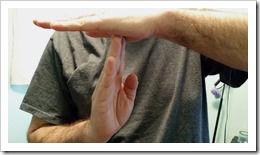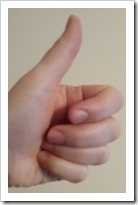 When kids in the US are playing a game and they want to temporarily pause it, they’ll yell, “Time-out!” Sometimes, they’ll also make a “T” with their hands or arms (see pic).
When kids in the US are playing a game and they want to temporarily pause it, they’ll yell, “Time-out!” Sometimes, they’ll also make a “T” with their hands or arms (see pic).
The term “time-out” comes from sports. They use it to pause games too.
More recently, I’ve heard kids say, “Pause!” It’s possible this comes from pausing video games.
In France, they say “pouce” (thumb) to call a time-out. They might also gesture with a thumbs up.
Frances Turnbull wrote, “Here in England, I’ve seen my daughter’s buddies calling ‘T-out’.”
 Nyango from Cameroon said, “As kids we used to say: ‘Wait! Wait!’ with the hand held up, palm facing outward (‘Wait’ is actually the Pidgin English version of ‘Hold on!’ and that’s how we used it). When my kids were younger, they said: ‘Take a break!'”
Nyango from Cameroon said, “As kids we used to say: ‘Wait! Wait!’ with the hand held up, palm facing outward (‘Wait’ is actually the Pidgin English version of ‘Hold on!’ and that’s how we used it). When my kids were younger, they said: ‘Take a break!'”
Agnieszka Magnucka wrote, “‘Pause’ or ‘T’ in Poland.”
Jessica Taylor-Kucia wrote, “Or ‘stop the game’ (Stop zabawa) in Poland.”
Emanuela Marsura wrote, “In Italy we say ‘Stop’ or ‘Pausa’. In my Venetian dialect I say ‘Bando’. You can’t translate this.”
How do you call a time-out where you’re from?
This article was posted on Thursday, January 14th, 2016 at 9:13 pm and is filed under Calling a Time-out in Games, Cameroon, Countries & Cultures, England, France, Games Around the World, Poland, Questions, Readers Questions, USA. You can follow any responses to this entry through the RSS 2.0 feed. You can skip to the end and leave a response. Pinging is currently not allowed.

























January 14th, 2016 at 9:43 pm
About the T gesture, we do it in France when 2 (or more) people are arguing uselessly, someone can make the T gesture to say “it’s time you stop” (which has a side meaning of “you’re bothering us” -to be polite!)
February 21st, 2016 at 11:11 pm
Hmmmmm… In Panama we have two ways:
T gesture: Kids say «¡triqui!» out loud. Some people think it comes from English “trick” or “tricky” but this doesn’t make much sense honestly. Personally, I think it’s a made-up word that ended up sounding like so.
Ohhhh, I’ll have to deescribe the second one: Think of one hand over the other in front of the middle of your chest, but separated by some air. Now tilt them slightly upwards. The hands tilted like this are the starting point. Then you do as if you would do a “shooing” motion, but your hands never dip down, and when the back of your hands is parallel to your chest the fingers should be diagonally (if you squish all your hands together, the fingers, thumbs included, should resemble a W, but don’t squish them) and then move them outwards like that until you resemble a “I’m unarmed gesture”. The hands remain like that at shoulder level, fingers slightly diagonal. This movement is fast, and only done after you get eerybody’s attention; and you yell «¡pausa!» (pause). I think this may be the older gesture because in my time kids said both, but my mother ever only knew the «pausa» gesture, and now kids only say «triqui».
February 22nd, 2016 at 5:33 am
Thanks for explaining that Edith! If you’d ever like to take a pic or a short video I can post it. Cheers! Mama Lisa
June 8th, 2016 at 12:23 pm
In the northwest of England, we crossed our fingers and shouted “barley” to stop a game, which I think is a corruption of the term “parley”, meaning “let’s discuss this situation” (used in real-life historical warfare situations) which in itself comes from the French word “Parlez”. My children also used this expression in their playgrounds 15-20 years ago.
March 5th, 2017 at 10:11 pm
Hi! In Poland, where I come from, we used to say “przerwa” which means “break”. Here, in England, children shout “time out” :)